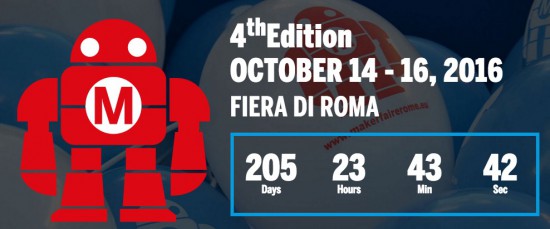Let’s warm up for Maker Faire Rome 4th edition!

Last friday in Rome during the press conference of Maker Faire Rome 4th edition, Riccardo Luna together with Massimo Banzi announced that next October the event is going to become “better, bigger and stronger”.
A new location by Fiera di Roma building will host six pavilions in an area of over 100.000 sq.m. for makers, visitors, conferences, seminars and workshops. The event promoted by the Rome Chamber of Commerce and powered by its Innovation Unit “AssetCamera “ is once more curated by Massimo Banzi, Arduino co-founder, along with Riccardo Luna, Italian Digital Champion.
The topics featured at Maker Faire Rome 2016 are going to be home automation, re-use, drones and robots, 3D printing, digital manufacturing, industry 4.0, IoT – Internet of things, mobility, safety & security, food , fashion, music and especially Food & Nutrition.Together with the Future Food Institute (FFI), trust voted to food and innovation, Maker Faire will focus on the intersection between food and technology and will deepen the relationship between nutrition, health & wellbeing. The “Call 4 Makers” 2016 will open on April 18th and will close on June 5th.
Maker Faire Rome is also looking for amazing project with a “Call for BigBang Projects” open until March 31st. The call will consider large-scale, entertaining, high impact, interactive projects. Installations and performances proposals will be welcome, too. The goal is to create the most immersive scenery one could dream of for a Faire of such character.
In the meanwhile take a look at the European Maker Week, an entire week of makers’ events, from May 30th to June 5th, promoted by The European Commission and implemented by Maker Faire Rome in collaboration with Startup Europe, the event:
aims to draw European citizens to the “Maker world” thanks to the aid of Fablabs, Makerspaces, Hackerspaces and the hardware startups environment. The goals of European Maker Week are two folds: create awareness about the importance of the maker culture to foster an education of creativity and innovation in all schools across Europe; build bridges between local authorities and media and the main players of their own local makers ecosystems. It is of particularly importance to reach out to new players (e.g. Schools) who have never organized a maker event before.
